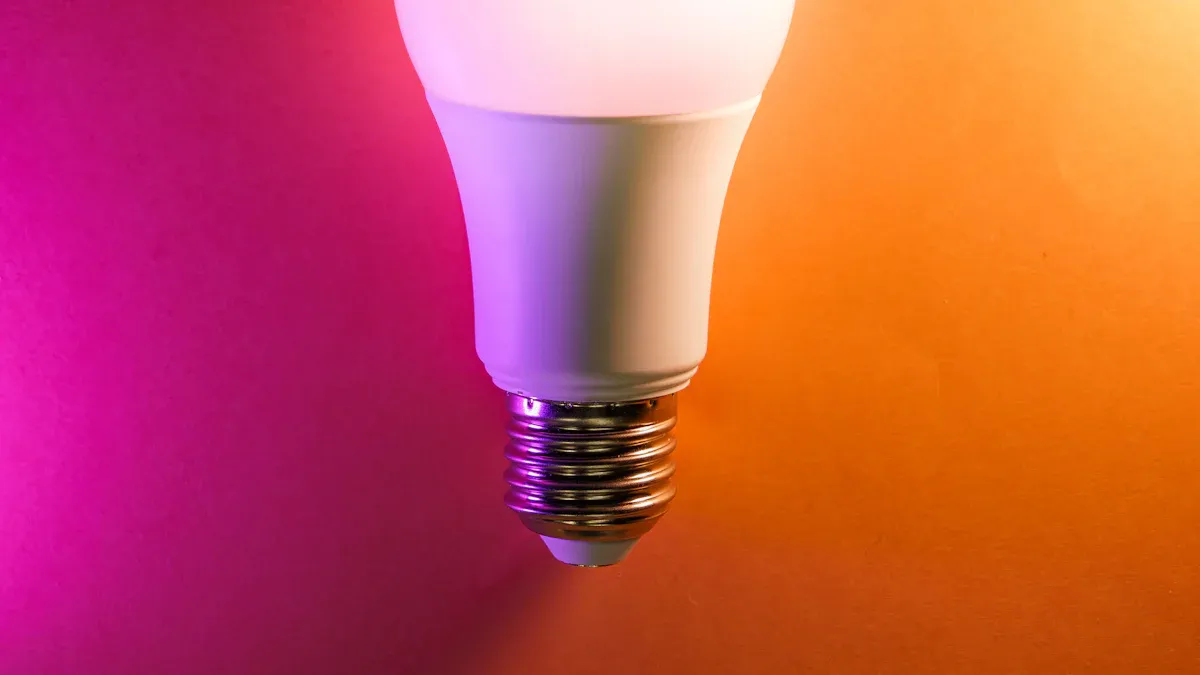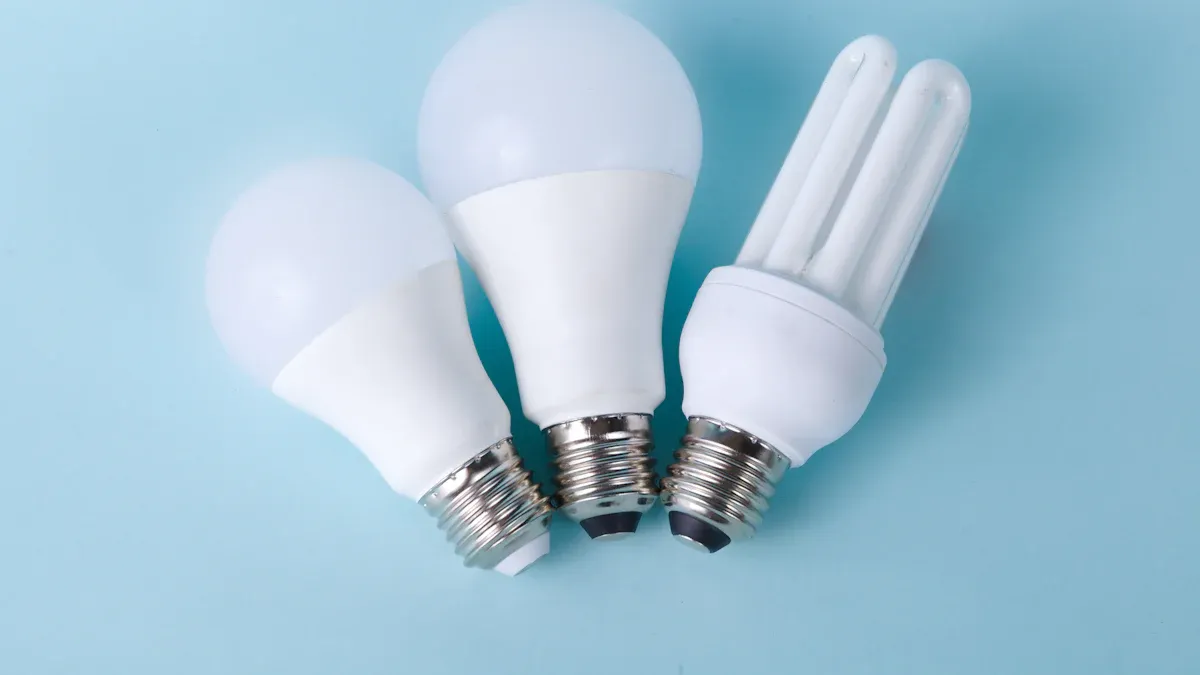Top 10 Replacement LED Bulbs for Energy Efficiency and Longevity

Switching to Replacement LED Bulbs is a smart choice for homes. These bulbs use up to 80% less power than old bulbs, which means you save money on your energy bills. They also last much longer, up to 50,000 hours, saving you money since you won’t need to replace them often. Replacement LED Bulbs are also better for the environment, as using them helps lower carbon emissions and keeps the planet greener. It’s good for your wallet and the Earth!
Key Takeaways
Using LED bulbs can cut energy costs by 80%, saving money.
LED bulbs last longer than regular ones, up to 50,000 hours.
LED bulbs are eco-friendly, reducing pollution and helping the Earth.
Benefits of Energy-Saving LED Bulbs

Save Energy and Lower Bills
Using LED bulbs can cut your electricity costs. They use 80% less energy than old-style bulbs. For instance, swapping a 60W bulb for a 10W LED saves money. LEDs need only 8-12 watts to shine as bright as 60W bulbs. This switch can save you about $50 yearly. If lights are on for long hours, like in offices, savings grow. You could save up to 70% on energy costs!
Longer Lifespan Than Old Bulbs
LEDs last much longer than incandescent or CFL bulbs. Regular bulbs burn out after 1,000 hours. LEDs can last 25,000 to 50,000 hours. That’s many years of use! Fewer replacements mean saving money and creating less waste. Here’s a simple comparison:
Bulb Type | Lifespan (Hours) |
|---|---|
Incandescent | 1,000 |
CFL | 8,000 |
LED | 25,000 - 50,000 |
Better for the Environment
LEDs help the planet by using less power. This lowers greenhouse gases. One LED bulb can cut carbon dioxide by half a ton over its life. If everyone used LEDs, the impact would be huge! The US EPA says LEDs could save enough power by 2030 to light seven million homes for a year. That’s a big win for the Earth.
Great for Many Uses
LED bulbs work well for all kinds of lighting needs. Want a cozy feel at home? Try colored LEDs. Need bright light for workspaces? Use high-power LEDs. Smart LEDs let you change brightness and color with an app. Whether for safety, decoration, or daily use, LEDs fit every need. They come in different colors and strengths, making them super useful everywhere.
Top 10 Replacement LED Bulbs for Energy Efficiency and Longevity
MaxLite LED Bulbs - Save Energy and Money
MaxLite LED bulbs are great for cutting energy costs. They use 80% less power than regular bulbs. For example, replace a 60-watt bulb with an 8-watt MaxLite LED. This change can save you about $52 yearly if used 5 hours daily with 10 bulbs. These bulbs last 25,000 to 50,000 hours, so you replace them less often. MaxLite bulbs are reliable and save money, making them a top choice.
Feit Electric LED Bulbs - Smooth Dimming and Dependability
Feit Electric LED bulbs are perfect for dimmable lighting needs. They dim smoothly without flickering or buzzing. Use them for bright workspaces or cozy rooms. These bulbs save energy while giving steady light. Feit Electric bulbs are dependable and fit many lighting needs.
LG LED Bulbs - Bright Light and Long Life
LG LED bulbs give bright, steady light for any room. They last up to 50,000 hours, so you won’t replace them often. LG focuses on quality and durability. These bulbs are great for living rooms or workspaces. LG bulbs are reliable and perform well.
Cree LED Bulbs - Strong and Reliable
Cree LED bulbs are made to last in tough conditions. They pass tests for high heat and strong currents. For example, Cree’s XLamp XHP50.3 HI H2 LED chip works even at 280°C. These bulbs are durable and energy-efficient. Cree is a trusted brand for challenging environments.
Philips LED Bulbs - Innovative and High-Quality
Philips LED bulbs mix smart features with great performance. The Philips LED Dimmable A19 Bulb dims without flickering and gives soft white light. It’s like a 60-watt bulb but uses less energy. With over 15,000 hours of life, Philips bulbs are reliable and energy-saving. Their advanced features make them a top pick.
Osram Ultra-Efficient LED Bulbs - Save the Most Energy
Osram LED bulbs are made to save the most energy. They use much less power than old-style bulbs. With a lifespan of up to 25,000 hours, they need fewer replacements. Osram bulbs are a great choice for saving energy and money.
GE LED Bulbs - Trusted and Versatile
GE LED bulbs are known for their variety and efficiency. They use 80% less energy than regular bulbs. GE offers many shapes and sizes, from standard to decorative bulbs. They also work with dimmer switches for adjustable brightness. GE bulbs are long-lasting and cost-effective.
Sylvania LED Bulbs - Affordable and Reliable
Sylvania LED bulbs are both budget-friendly and dependable. They last longer than regular bulbs, so you replace them less. Sylvania offers quality lighting at a good price. Whether for daily use or special needs, Sylvania has options for you.
EcoSmart LED Bulbs - Cheap and Energy-Saving
EcoSmart LED bulbs are great for saving money and energy. They use 90% less power than old bulbs, cutting electricity costs. With up to 25,000 hours of life, they need fewer replacements. EcoSmart bulbs are perfect for saving energy on a budget.
TCP LED Bulbs - Small and Long-Lasting
TCP LED bulbs are compact and last a long time. They use 85% less energy than regular bulbs, saving money. With up to 15,000 hours of life, they need fewer replacements. TCP bulbs come in many styles and brightness levels. They’re a great choice for energy-efficient lighting.
Comparison Table of Top Energy-Saving LED Bulbs

When buying energy-saving bulbs, knowing their features helps you decide. Here's a simple table comparing popular LED bulbs by brightness, energy use, lifespan, and cost:
Bulb Model | Lumens | Watts | Lifespan (Hours) | Price ($) |
|---|---|---|---|---|
EcoShine A19 | 800 | 8 | 25,000 | 4.99 |
PowerSaver LED | 800 | 7.5 | 20,000 | 5.49 |
GreenLight Max | 800 | 7 | 30,000 | 6.99 |
💡 Tip: Lumens show brightness, and watts show energy use. Lower watts with high lumens mean better efficiency.
Important Features: Wattage, Lumens, Color Temperature, Lifespan, and Price
Wattage and Lumens: Wattage shows energy use, and lumens show brightness. All three bulbs give 800 lumens, but GreenLight Max uses only 7 watts. It’s the most efficient choice.
Color Temperature: Measured in Kelvin (K), it changes how light looks. Lower numbers (2700K) feel warm and cozy. Higher numbers (5000K) feel cool like daylight.
Lifespan: LED bulbs last longer than old ones. GreenLight Max lasts 30,000 hours, saving money on replacements.
Price: Prices differ, but energy-saving bulbs save money over time. They lower bills and need fewer replacements.
Switching to energy-saving LED bulbs is smart for saving money and helping the planet. Look for energy-star labels to get the best and most reliable bulbs.
Factors to Think About When Picking Energy-Efficient Light Bulbs
Brightness and Lumens for the Best Lighting
When picking LED bulbs, focus on brightness, not wattage. Lumens show how bright a bulb is. More lumens mean brighter light. For example, a 60W old bulb gives 800 lumens. An LED bulb can give the same brightness using only 8-12 watts. Here's a simple chart:
Old Bulb Wattage | Lumens (Brightness) |
|---|---|
100W | 1600 lumens |
75W | 1100 lumens |
60W | 800 lumens |
40W | 450 lumens |
Think about the room's size and use. Kitchens need bright light. Bedrooms feel better with softer light. Always check lumens on the box to pick the right brightness.
Color Temperature to Set the Mood
Color temperature, in Kelvin (K), changes how light feels. Warm white light (2700K-3000K) feels cozy, great for bedrooms or living rooms. Neutral white (3500K-4000K) is balanced, good for kitchens or offices. Cool white (5000K-6500K) is bright and energizing, perfect for workspaces.
Color Temperature | How It Feels | Best For |
|---|---|---|
Warm White | Cozy and relaxing | Bedrooms, living rooms |
Neutral White | Balanced and natural | Kitchens, offices |
Cool White | Bright and energizing | Workspaces, kitchens |
Picking the right color temperature changes how a room looks and feels.
Works with Fixtures and Dimmers
Not all LED bulbs fit every fixture or dimmer. Check the box to see if it works with your setup. If you want dimmable lights, buy bulbs marked "dimmable." This stops flickering when adjusting brightness. Also, make sure the bulb fits your fixture. Standard A19 bulbs fit most fixtures, but some need special shapes or sizes.
💡 Tip: Always check the size and power needs of your fixture before buying.
Saves Money Over Time
Energy-saving bulbs cost less in the long run. LEDs may cost more at first, but they last longer and use less power. For example, one LED bulb lasting 25,000 hours replaces 25 old bulbs. This saves money on replacements. LEDs also use 80% less energy, cutting bills. Look for energy-star labels for the best savings and quality.
Switching to LED bulbs saves money and helps the planet. It’s good for your wallet and the Earth!
Tips for Maximizing the Lifespan and Efficiency of LED Bulbs
Install LED Bulbs the Right Way
To make LED bulbs last longer, install them properly. Match the bulb to the fixture's voltage and wattage. This stops overheating and keeps the bulb working well. Always turn off the power before installing to stay safe. Use the right tools, and ask for help if needed.
Read the instructions from the manufacturer carefully. Tightening the bulb too much can break it or the socket. If using dimmers, check if they work with LED bulbs to avoid flickering. When unsure, ask an electrician to help set things up correctly.
💡 Tip: High-quality LED bulbs with energy-star ratings often have warranties. These show they are durable and reliable.
Clean and Maintain Regularly
Clean LED bulbs to keep them bright and efficient. Use a soft cloth or brush to wipe off dust and dirt. This helps the bulb shine better and last longer.
Check connections often to ensure they are tight and not damaged. Make sure there’s good airflow around the bulb to stop it from overheating. For hard-to-reach fixtures, hire a professional to inspect them regularly.
🧹 Pro Tip: Follow the cleaning tips from the manufacturer. A little care keeps your bulbs working well.
Prevent Overheating and Power Surges
LED bulbs handle heat better than old bulbs but still need care. Most LED bulbs have heatsinks to manage heat. Ensure fixtures allow airflow to avoid overheating.
Power surges can harm LED bulbs. Use proper wiring and transformers to prevent issues. If your area has power spikes, use surge protectors to protect your bulbs.
⚡ Note: Don’t turn bulbs on and off too quickly. Let them cool before switching them back on.
Choosing the best energy-saving LED bulbs is a wise choice for homes or businesses. These bulbs use 80% less energy, cutting electricity costs. They also last much longer than old bulbs, from 25,000 to 50,000 hours. This means fewer replacements and less maintenance. Plus, they are better for the planet by reducing carbon emissions.
🌍 Did you know? If 95% of homes and 90% of businesses switch to LEDs, it could cut 15.69 gigatons of CO2e and save $4.47 trillion in lifetime costs.
Check out energy-star certified bulbs from our list for great performance and eco-friendliness. Start saving money and energy today by switching to LED bulbs!
FAQ
Why are LED bulbs better at saving energy than old bulbs?
LED bulbs use less energy but give the same brightness. They turn most energy into light instead of heat, saving power.
Can I use LED bulbs with dimmer switches?
Yes, but only dimmable LED bulbs will work. Check the box to make sure they match your dimmer switch to stop flickering or problems.
How do I pick the right brightness for a room?
Focus on lumens, not watts. For example, 800 lumens are good for bedrooms, while 1,100 lumens are better for kitchens or work areas. Choose brightness based on the room's use.
💡 Tip: Always read the lumens and color temperature on the bulb's box to get the best light for your space.
See Also
Modern LED Street Lights: Benefits of Efficiency and Longevity
Choosing GE LED Bulbs: Key Features and Advantages Explained
Efficiency and Applications of Industrial LED Light Bulbs
Types and Advantages of LED Replacement Lighting Solutions
Understanding LED Light Bulbs: Technology and Selection Guidance

